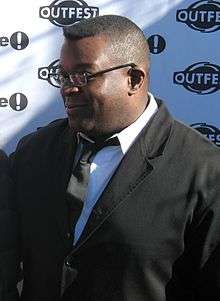Isaac Julien
| Isaac Julien | |
|---|---|
 | |
| Born |
21 February 1960 London, England |
| Occupation | Installation artist and filmmaker |
Isaac Julien (born 21 February 1960)[1] is an installation artist and filmmaker.[2]
Early life
Julien was born in the East End of London, one of the five children of his parents, who had migrated to Britain from St Lucia.[1] He graduated from Saint Martin's School of Art in 1985, where he studied painting and fine art film. He co-founded Sankofa Film and Video Collective in 1983,[1] and was a founding member of Normal Films in 1991.
Career
Julien came to prominence in the film world with his 1989 drama-documentary Looking for Langston, gaining a cult following with this poetic exploration of Langston Hughes and the Harlem Renaissance. This following was expanded in 1991 when his film Young Soul Rebels won the Semaine de la Critique prize for best film at the Cannes Film Festival.
One of the objectives of Julien's work is to break down the barriers that exist between different artistic disciplines, drawing from and commenting on film, dance, photography, music, theatre, painting and sculpture, and uniting these to construct a powerfully visual narrative. Thematically, much of his work directly relates to experiences of black and gay identity (he is himself gay),[2] including issues of class, sexuality, and artistic and cultural history. He was nominated for the Turner Prize in 2001, and in 2003 he won the Grand Jury Prize at the Kunst filmBiennale in Cologne for his single screen version of Baltimore. Julien is also a documentary filmmaker - his work in this genre includes BaadAsssss Cinema, a film on the history and influence of blaxploitation cinema.
Collaborations
Julien readily cites cultural theorist and sociologist Stuart Hall as an important influence on his filmmaking. Hall narrates a portion of Julien's critically acclaimed "Looking for Langston." Julien involves Hall in his work once more in the 1996 film "Frantz Fanon: Black Skin, White Mask" which tells the story of Frantz Fanon, the theorist and psychiatrist from Martinique.[3]
Personal life
Julien lives and works in London. He was visiting lecturer at Harvard University's Schools of Afro-American and Visual Environmental Studies, and is currently a visiting professor at the Whitney Museum of American Arts. He was also a research fellow at Goldsmiths College, University of London, and in September 2009 he became a professor at the Karlsruhe University of Arts and Design. Julien is a patron of the Live Art Development Agency.[4]
Selected bibliography
Installation pieces
.jpg)
- PLAYTIME (2013)
- TEN THOUSAND WAVES (2010)
- Te Tonga Tuturu/True South (Apparatus) (2009)
- Dungeness (2008)
- WESTERN UNION: Small Boats (2007)
- Fantôme Créole (2005)
- Fantôme Afrique (2005)
- True North (2004)
- Radioactive (2004)
- Baltimore (2003)
- Lost Boundaries (2003)
- Paradise Omeros (2002)
- Vagabondia (2000)
Filmography
- Who Killed Colin Roach? (1983)
- Territories (1984)
- The Passion of Remembrance (1986)
- This is Not an AIDS Advertisement (1987)
- Looking for Langston (1989)
- Young Soul Rebels (1991)
- Black and White in Colour (1992)
- The Attendant (1992)
- Darker Side of Black (1993)
- The Question of Equality (senior producer) (1994)
- Frantz Fanon: Black Skin, White Mask (1996)
- Three (1999)
- The Long Road to Mazatlan (1999)
- Paradise Omeros (2002)
- BaadAsssss Cinema (2002)
- Baltimore (2003)
- Derek (2008)
Journal articles
- Julien, Isaac; hooks, bell (1991). "States of desire". Transition. Indiana University Press on behalf of the Hutchins Center for African and African American Research at Harvard University via JSTOR. 53: 168–184. doi:10.2307/2935186. JSTOR 2935186.
- "Critic bell hooks and British filmmaker Isaac Julien on sex, style, and cinema."
- Julien, Isaac (2007). "Cinematic rearticulations". Anglistica Aion: An Interdisciplinary Journal. 11 (1–2): 63–71. Pdf.
References
- 1 2 3 Annette Kuhn, "Julien, Isaac (1960-)", BFI Screen Online.
- 1 2 Rich, B. Ruby (14 May 2002). "Still a soul rebel: the work of Young Soul Rebels director Isaac Julien, from his films to his video installations, is honored with a retrospective". The Advocate. Archived from the original on 12 February 2007. Retrieved 1 April 2007.
- ↑ Julien, Isaac (June 2015). "Muse: Stuart Hall". Art in America (June/July Issue): 48–49.
- ↑ http://www.thisisliveart.co.uk/about_us/patrons.html
Further reading
- Craine, Debra (24 September 2007). "Dance: A marriage of jigs and reels". The Times. London: News UK. Retrieved 3 October 2007. (subscription required (help)).
- Cariello, Marta (2007). "Movement in between: the difference this time". Anglistica Aion: An Interdisciplinary Journal. 11 (1–2): 55–61. PDF, ISSN 2035-8504 (www.anglistica.unior.it)
- Also published in: "The Other Cinema, The Cinema of the Other", UNOPress, Napoli.
External links
- Isaac Julien's official website
- Isaac Julien's page at the Victoria Miro Gallery, London
- "Third Pole: The Stills of Isaac Julien's True North". Essay by Nizan Shaked in X-TRA : Contemporary Art Quarterly
- Isaac Julien biography and credits at the British Film Institute's Screenonline
- Isaac Julien in the Video Data Bank
- Isaac Julien at Women Make Movies